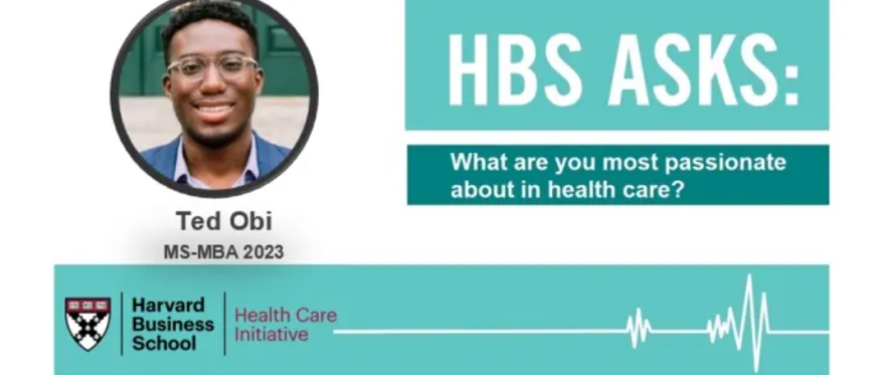Ted Obi (MS/MBA 2023) is a current MBA student at HBS and a third year medical student at the Icahn School of Medicine at Mount Sinai. His previous experiences include co-founding Melanin Doc, a non-profit supporting the next generation of minority health care providers as well as co-founding the Diversity Innovation Hub, a Mount Sinai venture addressing social and structural determinants of health in NYC. Recently, Ted was named an HBS Kaplan Fellow and RISE Fellow.
While on my pediatrics rotation at a hospital in New York City, I received the news that I was accepted to Harvard’s MS/MBA Biotechnology: Life Sciences joint degree program.
To many, the idea of halting my medical school education so close to the finish line seemed misaligned.
To most, the simultaneous pursuit of three degrees appeared unnecessary.
To me, I saw an opportunity to develop another skillset - a new language.
Before this, I had spent years solidifying my knowledge of disease mechanisms, understanding clinical medicine paradigms, and most importantly, learning how to empathize with patients from all walks of life. Over time, I learned a common language within medicine that allows me to speak with clinicians and scientists. Learning a new language takes time, and I’ve found immersive learning to be the most effective strategy in achieving such a feat. Consequently, a full-time business school program felt like the appropriate next step.
At the culmination of my HBS experience, I hope to be trilingual, understanding the nuances of business, science, and medicine so that I can help shape a more equitable and accessible health care system.
My interest in the business of medicine took shape while in medical school. As a first-year medical student, I co-founded the Diversity Innovation Hub (DIH) alongside physicians and students alike who believed there was a dire need to leverage technology to address the social needs of the patients we cared for. Our mission for the DIH is to support innovation that addresses social determinants of health (SDoH) for underserved communities while also increasing the participation of diverse voices in the health care technology space.
To address top of the funnel barriers in attracting diverse talent, we formed the DIH fellowship, which has sent a number of Black, Latinx, and female fellows to health care technology and venture capital firms to learn more about the industry. Innovation comes in all shapes and sizes. This staunch belief was the impetus behind the formation of DIH Pipeline and DIH Incubator which has supported founders who may not have fit the typical founder profile, but instead have real- lived experiences and a nuanced understanding of the issues they intend to address. Fundamentally, I believe in people and their ability to impact their community if given the adequate resources. At DIH, a major objective has been to empower individuals who are passionate about leveraging innovation to uplift their communities.
Entrepreneurship coupled with health care unveiled the impact that is possible outside the traditional realm of clinical medicine, where I could only care for one patient at a time. There was a stark shift from my preclinical years to my clinical years of medical school. Previously, I spent most of my time studying mechanisms of disease. Now, I was charged with understanding the manifestations of disease and tailoring management decisions for each patient holding their sociocultural values, socioeconomic status, and religious affiliation in consideration. I truly loved seeing patients, hearing their stories, and partnering with them to help them meet their health goals. Being in the clinic was a great opportunity for me to apply what I previously learned in real-time to help a real patient. Unexpectedly, spending time with patients re-focused my interest back to molecular biology and its application in biotechnology. On my psychiatric rotation, I witnessed patients of similar ages as me in a state of mental turmoil without effective treatment options to mitigate their suicidal tendencies. The impact of producing more efficacious, potentially curative medicines for these patients and reducing their suffering is extremely compelling and was the catalyst for my pursuit of an MS/MBA in Biotechnology degree.
As a joint degree student, I benefit from immersive case studies at HBS where my classmates and I are challenged to analyze the business and ethical considerations of each managerial decision. On the other hand, at the Harvard Stem Cell and Regenerative Biology department, we interrogate scientific papers and consider the business case for the commercialization of cutting-edge science. Both programs surgically align with my goal of becoming one of many players impacting the broader health care and life sciences industry. Looking forward, I hope to be a lifelong student and continue to learn new languages that may inform how we create a more accessible health care system as well as produce more efficacious therapies because patients are waiting.
This article was originally published on the HBS Health Care Initiative blog.

